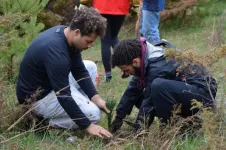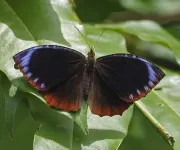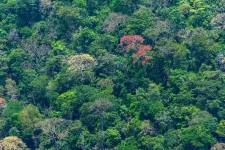INFORMATION:
About the Wildlife Conservation Society
WCS saves wildlife and wild places worldwide through science, conservation action, education, and inspiring people to value nature. To achieve our mission, WCS, based at the Bronx Zoo, harnesses the power of its Global Conservation Program in nearly 60 nations and in all the world's oceans and its five wildlife parks in New York City, visited by 4 million people annually. WCS combines its expertise in the field, zoos, and aquarium to achieve its conservation mission. Visit: newsroom.wcs.org Follow: @WCSNewsroom. For more information: 347-840-1242.
About the Doris Duke Charitable Foundation (DDCF). The mission of the Doris Duke Charitable Foundation is to improve the quality of people's lives through grants supporting the performing arts, environmental conservation, medical research and child well-being, and through the preservation of the cultural and environmental legacy of Doris Duke's properties. The foundation's Environment Program seeks to enable communities to protect and manage wildlife habitat and create efficient built environments. An awareness of climate change as the greatest emerging threat to biodiversity--and the need to aggressively mitigate it without unnecessarily sacrificing wildlife habitat--shapes the Environment Program's grant-making priorities. In addition to funding researchers from the WCS Global Conservation Program, DDCF also funds the WCS Climate Adaption Fund. For more information, visit ddcf.org.
About the University of British Columbia's (UBC) Faculty of Forestry. UBC's Faculty of Forestry is a global leader in forestry education and research. What began in 1921, today embodies a comprehensive offering of undergraduate and graduate programs as well as world-renowned research and initiatives. Our programs and research draw from all forest science disciplines and model the broad spectrum of topics relating to forests' interplay between our environment and all those who live on our planet. For more information, visit forestry.ubc.ca/news/media-centre.
About the IUCN SSC Climate Change Specialist Group
The IUCN SSC Climate Change Specialist Group is a global network of scientists working at the research-policy-practice interface to strengthen nature conservation in a changing climate. With more than 60 members worldwide, we work at the forefront of climate change and biodiversity science to bridge knowledge gaps, build collaborations, and strengthen the community of practice around climate-focused conservation. Learn more at ccsg-iucn.com or follow us on Facebook (IUCN SSC Climate Change Specialist Group) or Twitter (@IUCN_CCSG).
New classification marks paradigm shift in how conservationists tackle climate change
2021-01-14
(Press-News.org) NEW YORK (January 14) -- A new study co-authored by researchers from the Wildlife Conservation Society's (WCS) Global Conservation Program and the University of British Columbia (UBC) Faculty of Forestry introduces a classification called Resistance-Resilience-Transformation (RRT) that enables the assessment of whether and to what extent a management shift toward transformative action is occurring in conservation. The team applied this classification to 104 climate adaptation projects funded by the WCS Climate Adaptation Fund over the past decade and found differential responses toward transformation over time and across ecosystems, with more transformative actions applied in forested ecosystems.
The RRT classification addresses a continuum from actively resisting changes - in order to maintain current or historical conditions--through accelerating ecological transitions through approaches such as translocating species to new areas. Results show a shift from more resistance-type actions to transformative ones in recent years. Most transformation-oriented projects involved translocation of trees or other plants, commonly in forest ecosystems, with exceptions including, for example, translocating seabird species to habitat where they may be more likely to survive. Other ecosystems with more transformative projects occurred in coastal aquatic and urban/suburban ecosystems.
Unprecedented environmental changes such as increased frequency and severity of heatwaves, droughts, storms, heavy rainfalls, and wildfires, have degraded ecosystems, disturbed the economy, and led to the loss of lives and livelihoods. Conventional conservation strategies may be ineffective in dealing with changing environmental conditions: wildfires could decimate protected old-growth forests and endangered species, and coastal conservation easements could become inundated by rising seas. Novel conservation actions aimed specifically at helping ecosystems adapt to the mounting impacts of climate change contrast with approaches that aim to maintain current or historical conditions. Transformative actions, such as species translocation, were once more controversial than they are today; they are now increasingly highlighted as necessary components of conservation in an effort to implement projects that are more robust to future climates. However, few studies have systematically examined on-the-ground conservation adaptation projects to assess the extent to which such transformational adaptation actions are being implemented, through what approaches, and in what ecosystems.
This study, published in Nature Communications Biology, assessed projects implemented within the United States but the authors see broader applications. "Our classification could be applied to a suite of conservation projects across the world to determine if a global shift in practice is occurring," said co-author Lauren Oakes, a Conservation Scientist at WCS and Adjunct Professor at Stanford University. Guillaume Peterson St-Laurent, the lead author and a postdoc at the University of British Columbia, says the team is interested in creating an online platform for tracking projects assessed with the new classification around the globe. "We hope to be working with international teams in the not-so-distant future as we envision this new tool could be applied to many different ecological scenarios," says Peterson St-Laurent.
The interdisciplinary research team was supported by the Doris Duke Charitable Foundation, and the study was conducted in partnership with the IUCN Species Survival Commission's Climate Change Specialist Group.
Precautionary actions aimed at resistance or resilience--such as protecting intact ecosystems--are incredibly valuable in the suite of responses needed to address current and future climate change. But the authors suggest that degraded ecosystems or working landscapes may require more transformative actions and the public support to do so, in an effort to meet the shifting goals in a changing climate. This research provides evidence of a paradigm shift, as practitioners and funders move more in this critical direction.
ELSE PRESS RELEASES FROM THIS DATE:
Behaviors surrounding oral sex may increase HPV-Related cancer risk
2021-01-14
A wide breadth of behaviors surrounding oral sex may affect the risk of oral HPV infection and of a virus-associated head and neck cancer that can be spread through this route, a new study led by researchers at the Johns Hopkins Kimmel Cancer Center suggests. These findings add nuance to the connection between oral sex and oropharyngeal cancer -- tumors that occur in the mouth and throat -- and could help inform research and public health efforts aimed at preventing this disease.
The findings were reported Jan. 11 in the journal Cancer.
In the early 1980s, researchers realized that nearly all cervical cancer is caused by the human papillomavirus (HPV), a DNA virus from the Papillomaviridae family. Although about 90% of HPV infections ...
The richer you are, the more likely you'll social distance, study finds
2021-01-14
The higher a person's income, the more likely they were to protect themselves at the early stages of the Covid-19 pandemic in the United States, Johns Hopkins University economists find.
When it comes to adopting behaviors including social distancing and mask wearing, the team detected a striking link to their financial well-being. People who made around $230,000 a year were as much as 54% more likely to increase these types of self-protective behaviors compared to people making about $13,000.
"We need to understand these differences because we can wring our hands, and we can blame and shame, but in a way it doesn't matter," said Nick Papageorge, the Broadus Mitchell Associate Professor of Economics. "Policymakers just need to recognize who is going ...
New way to control electrical charge in 2D materials: Put a flake on it
2021-01-14
Physicists at Washington University in St. Louis have discovered how to locally add electrical charge to an atomically thin graphene device by layering flakes of another thin material, alpha-RuCl3, on top of it.
A paper published in the journal Nano Letters describes the charge transfer process in detail. Gaining control of the flow of electrical current through atomically thin materials is important to potential future applications in photovoltaics or computing.
"In my field, where we study van der Waals heterostructures made by custom-stacking atomically ...
Deep learning outperforms standard machine learning in biomedical research applications
2021-01-14
ATLANTA--Compared to standard machine learning models, deep learning models are largely superior at discerning patterns and discriminative features in brain imaging, despite being more complex in their architecture, according to a new study in Nature Communications led by Georgia State University.
Advanced biomedical technologies such as structural and functional magnetic resonance imaging (MRI and fMRI) or genomic sequencing have produced an enormous volume of data about the human body. By extracting patterns from this information, scientists can glean ...
Study demonstrates efficacy of new treatment for neurofibromatosis type 1-related tumors
2021-01-14
Philadelphia, January 14, 2021--Based on preclinical studies of an investigational drug to treat peripheral nerve tumors, researchers at Children's Hospital of Philadelphia (CHOP) as part of the Neurofibromatosis Clinical Trials Consortium have shown that the drug, cabozantinib, reduces tumor volume and pain in patients with the genetic disorder neurofibromatosis type 1 (NF1). The results of the Phase 2 clinical trial, co-chaired by Michael J. Fisher, MD at CHOP, were published recently in Nature Medicine.
"This is the second class of drugs to demonstrate ...
CCNY's David Lohman finds Asian butterfly mimics different species as defense mechanism
2021-01-14
Many animal and insect species use Batesian mimicry - mimicking a poisonous species - as a defense against predators. The common palmfly, Elymnias hypermnestra (a species of satyrine butterfly), which is found throughout wide areas of tropical and subtropical Asia, adds a twist to this evolutionary strategy: the females evolved two distinct forms, either orange or dark brown, imitating two separate poisonous model species, Danaus or Euploea. The males are uniformly brown. A population group is either entirely brown (both males and females) or mixed (brown males and orange females).
City College of New York entomologist David Lohman and his collaborators studied the genome of 45 samples representing 18 subspecies across Asia to determine ...
Presidential inaugurations boost tourism, but not this year
2021-01-14
While new research from West Virginia University economists finds that presidential inaugurations have gained popularity as must-see tourist events in recent years, major security threats will keep visitors away for the inauguration of President-Elect Joe Biden.
Published in "Tourism Economics," the study, by Joshua Hall, chair and professor of economics, and economic doctoral student Clay Collins, examined the impact of the inaugurations of Barack Obama and Donald Trump on hotel occupancy in the Washington, D.C.-area.
Daily occupancy rates around the inaugurations were four-to-six times higher than the next largest event in the sample. The research team also concluded ...
Tetris is no longer just a game, but an algorithm, which ensures maximum room occupancy
2021-01-14
To achieve full occupancy, hotels used to rely exclusively on experience, concentration and human abilities. Then came online booking, which made the reservation collection process faster, but did not solve the risk of turning down long stays because of rooms previously booked for short stays.
To avoid overbooking (accepting more reservations than there is room for) in some cases online sales are blocked before hotels are completely booked. The solution that the University of Trento has just discovered could change the life of hotels by increasing the number of occupied rooms and, therefore, in the revenue of hotel owners.
For an average Italian hotel (50 rooms), ...
Study gauges psychological impact of COVID-19 pandemic on university students
2021-01-14
More than half of all university students in the United States have experienced high levels of psychological impact from the COVID-19 pandemic, according to a new study published in the open-access journal PLOS ONE by Matthew Browning of Clemson University, US, and colleagues.
University students are increasingly recognized as a psychologically vulnerable population, suffering from higher levels of depression, anxiety, substance abuse and disordered eating compared to the general population. Moreover, college students have been among the most strongly affected by COVID-19 because of uncertainty regarding academic success, future careers and social life during college, among other concerns.
In the new study, researchers collected data on 2,534 students ...
Smithsonian scientists reduce uncertainty in forest carbon storage calculations
2021-01-14
Investors who bet on tropical forest conservation and reforestation to solve global warming by storing carbon in wood face huge uncertainties because the science behind predicting carbon stocks is still shaky. Even the best Earth Systems Models fail to predict how carbon stored by tropical forests varies from place to place. The New Phytologist invites scientists doing the "most-exciting, ground-breaking research" to review timely topics in a way that non-scientists can understand. Helene Muller-Landau, staff scientist at the Smithsonian Tropical Research Institute (STRI) was chosen to write the authoritative Tansley Review ...





